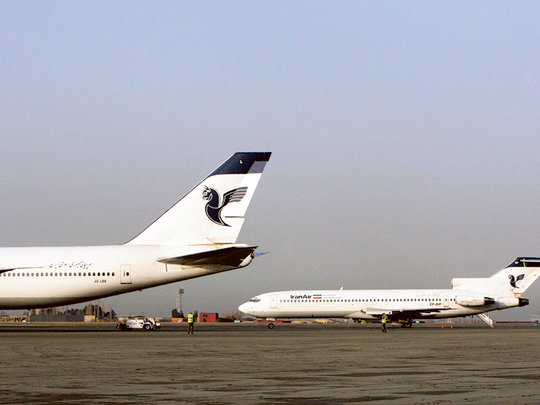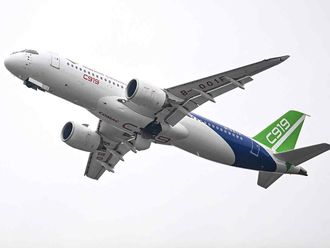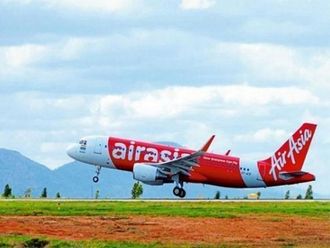
Tehran, Paris, New York: The United States on Wednesday removed a final hurdle for Western aircraft manufacturers to sell planes to Iran, a country desperately in need of hundreds of new aircraft.
The Treasury Department granted the aviation giants Airbus and Boeing licences to deliver planes to Tehran. The decision is a boon not only for the two companies but also for Iranian politicians who want to expand Iran’s engagement with the world now that sanctions linked to Iran’s nuclear programme have been lifted.
A spokesman for Boeing said the license covered the sale of 80 planes to Iran’s national carrier, Iran Air. Airbus confirmed that it received a license for an initial sale of 17 planes, part of a larger deal that involves a total of 118 planes.
The green light for aircraft sales allows Iran, a country of 80 million, to start rebuilding its ageing fleet of Boeing planes and other second-hand aircraft purchased clandestinely from third countries. Over the past four decades, hundreds of Iranians have died in crashes caused by malfunctioning or poorly maintained aircraft.
“From today, we will have safe planes,” President Hassan Rouhani of Iran promised in January when the accord between Iran and six world powers, including the United States, became fully operational.
Under that deal, Iran has given up parts of its nuclear program in exchange for sanctions relief. Since then the country has managed to increase its oil sales, but it has not been able to sign major deals with Western companies because of continuing banking restrictions related to non-nuclear sanctions.
While the United States has relaxed most of its sanctions against Iran, Washington still demands that even non-American manufacturers wishing to sell to Iran obtain an export license if their products include materials made in the United States. Airbus, based in Europe, buys more than 40 per cent of all its aircraft parts in the United States.
The granting of the licenses is likely to draw protests from some members of Congress, who have noted that Iranian commercial aircraft have been used to transport troops and weapons into Syria. Rep. Peter Roskam, R-Ill., said in a statement that the Obama administration “has once again made a political decision to appease Iran at the expense of our national security.” He said Congress was committed to making the process of delivering the planes as difficult and expensive as possible.
Western political analysts who specialise in Iran said the Treasury’s decision reflected an effort by the Obama administration to help Rouhani, who staked much of his political reputation on promised economic dividends from the termination of nuclear sanctions.
“The US is interested in constructive engagement with Iran, despite continuing turmoil in the bilateral relationship,” said Cliff Kupchan, the chairman of the Eurasia Group, a Washington-based political consultancy. He called the license approvals “a big win for President Rouhani, who needs to show Iranians that the nuclear deal is bringing concrete improvements to their lives.”
Iran had called for a meeting on the sidelines of the UN General Assembly with representatives of the world powers that signed the nuclear agreement — Russia, China, Germany, France, Britain and the United States — to complain about the lack of progress in carrying out the terms of the deal.
“This is very good news for President Rouhani,” said Nader Karimi Joni, an analyst who supports the government. “He needed this news back home. Bringing Airbus will fend off critics and make him popular.”
Some in Iran, however, objected to what they said was political manoeuvring in the timing of the Treasury Department’s decision to grant the licenses.
“This is a bribe by the Americans to increase the chances of President Rouhani to be re-elected,” said Hamidreza Taraghi, a conservative analyst and political figure. “The American president, in his last months in the White House, wants to give as much support as possible to Rouhani’s government and his pro-Western faction.”
According to the Treasury Department, the licenses contain strict conditions to ensure that the planes will be used exclusively for commercial passenger use, and cannot be resold or transferred to another entity.
A Boeing spokesman said the company was hoping to sell 46 single-aisle 737s; 30 wide-body 777s and four 747s.
Justin Dubon, an Airbus spokesman in Toulouse, France, confirmed that the plane maker had obtained an initial license from the Treasury to sell 17 planes to Iran — part of a landmark, multibillion-dollar order announced in January for 118 Airbus aircraft, ranging from smaller single-aisle jets to several 555-seat A380 “superjumbo” wide-body aircraft.
It remains unclear how Iran is planning to pay for the aircraft. After years of sanctions and low oil prices, the state’s coffers are empty. International credit continues to be virtually unavailable, with large banks shying away from dealing with Iran because of complicated regulations and continuing unilateral US sanctions against Iran, designated a “state sponsor of terrorism” by the United States.












